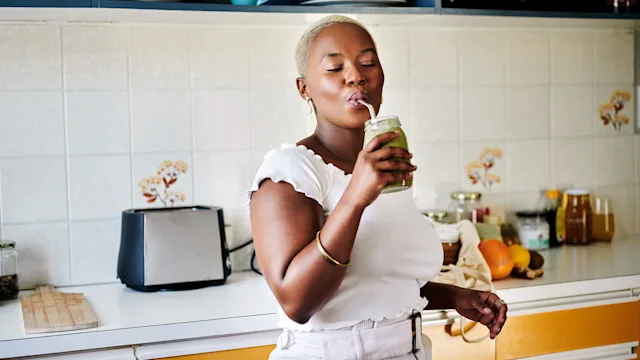Key takeaways:
Probiotics are live microorganisms that may provide health benefits when you consume them.
There are hundreds of different strains of probiotics. The best probiotics for women’s health often include strains from two major probiotic types: Lactobacillus and Bifidobacterium.
Women may take probiotics to aid in weight loss, help alleviate anxiety, or manage gut health. With probiotics, it’s key to choose the correct strain for the health concern.
It appears to be safe to take probiotics during pregnancy and while breastfeeding. But you should check with your healthcare team first. During pregnancy, taking probiotics may help alleviate nausea, vomiting, and constipation.
Probiotics are live microorganisms, like healthy bacteria and yeasts. They provide benefits for gut and overall health. Probiotics are found in fermented foods, probiotic-enriched foods, and supplements.
Studies show that women are more likely than men to take probiotics. And there are specific strains that may be beneficial for health concerns that affect many women.
What are the best probiotics for women?
There isn’t one probiotic that works best for every woman. Probiotic supplements can contain a single strain or a mix of several different types. And researchers are still learning how these different strains affect women’s health.
Before we dive into which probiotics may be most helpful, it’s useful to know how probiotics are grouped. Strains are often categorized by their genus, or “family.” Within each genus, there are many different species and strains, each with its own potential benefits.
When it comes to women’s health, two probiotic types stand out: Lactobacillus and Bifidobacterium.
Lactobacillus
Lactobacillus plays a big role in women’s health. In fact, most of the “good” bacteria that live in the vagina belong to this group. Experts believe that these vaginal bacteria play a crucial role in women’s health, from puberty to menopause.
Lactobacillus strains may support health by:
Keeping the vaginal and gut pH balanced
Preventing the growth of harmful bacteria
Decreasing inflammation
Improving vaginal health during menopause
Bifidobacterium
Bifidobacterium is an important probiotic for gut health. It’s one of the first types of bacteria to appear in a baby’s gut, and it continues to play a key role in adulthood.
Probiotics for yeast infections: Probiotics may not treat yeast infections by themselves, but adding probiotics to your treatment plan can help.
Probiotic-rich foods: From kimchi to miso, find out which foods are filled with probiotics, and how they can benefit your body.
Are your probiotics working? Learn what signs you can look for to determine whether your probiotics are helping you.
Bifidobacterium promotes health by:
Strengthening the gut
Improving digestion
Fighting against harmful bacteria
Helping the body make vitamins
What are the health benefits of probiotics for women?
You may be wondering, “What do probiotics do for women?” Well, probiotics have been researched as potential treatments for many health conditions. Here are six possible health benefits of probiotics for women — plus the types of strains that may support each health concern.
Read more like this
Explore these related articles, suggested for readers like you.
1. Vaginal health benefits
Probiotics may be helpful for treating vaginal conditions, such as yeast infections and bacterial vaginosis. Studies suggest that adding probiotics to standard treatment may help either initial or recurrent vaginal yeast infections.
Specific strains to look for to possibly support vaginal health include:
Lactobacillus crispatus
Lactobacillus jensenii
Lactobacillus gasseri
Lactobacillus rhamnosus
Lactobacillus reuteri
Some probiotics contain a blend of these strains and may be sold under a name that includes descriptors like “feminine” or “women’s blend.”
Studies show that Lactobacillus may even be able to fight cervical cancer cells and protect against infection. So, it’s important to maintain a healthy balance of these microorganisms for vaginal health.
2. Mental health benefits
The gut and brain are linked. And there’s a theory that boosting the gut microbiome with probiotics may positively affect mental health. But probiotics should only be an add-on treatment. They shouldn’t be a replacement for other mental health treatments, such as therapy and medication.
There’s evidence that probiotics may help ease depression and anxiety symptoms. But more research on a variety of strains is needed.
So far, some probiotic strains that have been studied for mental health benefits include:
Lactobacillus fermentum
Lactobacillus rhamnosus
Lactobacillus plantarum
Lactobacillus helveticus
Bifidobacterium longum
Sometimes, combining multiple strains gives the best effect. For example, a combination of Bifidobacterium longum and Lactobacillus helveticus may help improve mood and reduce stress and anxiety.
3. Weight-loss benefits
According to the CDC, more women than men attempt to lose weight, and this appears to be the case across different age groups. There’s some evidence that certain probiotics may be helpful for weight loss.
Scientists are still learning about how probiotics may promote healthy weight management. Probiotics may help with weight loss by changing how your body absorbs calories, feels full, and stores fat.
Probiotic strains that may help weight loss include:
Lactobacillus gasseri
Lactobacillus plantarum
Bifidobacterium bifidum
4. Gut-health benefits
Probiotics are commonly known for their impact on gut health. Studies show that certain probiotics may help digestive issues, like constipation and irritable bowel syndrome (IBS), and prevent diarrhea linked to antibiotics. IBS and constipation affect more women than men. And these symptoms can worsen during menstrual cycles.
Probiotic strains that may help relieve constipation include:
Bifidobacterium lactis
Bifidobacterium longum
Lactobacillus reuteri
Strains that may help treat IBS include:
Bifidobacterium longum
Lactobacillus plantarum
Lactobacillus acidophilus
Lactococcus lactis
There are also some studies that show probiotics may possibly help treat inflammatory bowel diseases, such as colitis.
Strains that may be effective at treating inflammatory bowel disease include:
Saccharomyces boulardii
Lactobacillus rhamnosus.
5. Benefits for the common cold and immune system
Some probiotics may help keep your immune system strong and fight off colds. One study found that taking a mix of probiotics — including Lactobacillus casei, Lactobacillus paracasei, and Lactobacillus fermentum — before cold season helped reduce the frequency of upper respiratory tract infections.
Another study found that people who took Lactobacillus paragasseri SBT2055 had fewer cold symptoms, like runny nose, sneezing, and fever.
It still isn’t clear which strain is most effective for keeping the immune system strong. In fact, a different study using a completely different set of Lactobacillus strains (not the ones mentioned above) also found that probiotics helped get rid of a cold faster.
6. Pregnancy and breastfeeding benefits
Based on the research, probiotics for women who are pregnant or breastfeeding are safe. Only minimal side effects (such as gas and vaginal discharge) have been observed from taking Lactobacillus rhamnosus and Lactobacillus reuteri.
The potential benefits of taking probiotics while pregnant or breastfeeding include:
Lowered risk of preeclampsia
Lowered risk of mastitis (clogged milk ducts)
Easing of IBS, constipation, or other digestive symptoms
Reduced risk of eczema for the baby
How to choose the best women’s probiotic for you
There are several factors that can help you choose the best probiotic supplement for you. When picking out a probiotic, consider these factors:
Your needs: First, talk with a healthcare professional. They can help you identify the correct strains and dosage to meet your individual needs.
Formulation: Decide if you would like to take probiotics as a pill, powder, or other formulation.
Ingredients: Consider how the other ingredients in supplements could affect your health. Many contain additives, allergens, or added sugar.
Quality and safety: Choose supplements that have been third-party certified by the U.S. Pharmacopeia, ConsumerLab.com, or NSF International.
Effectiveness: Look for supplement brands that have been clinically tested for efficacy.
Cost: Decide which option best fits your budget.
How long does it take for probiotics to work?
It’s hard to say how long it’ll take for probiotics to work. It depends on what you’re treating and what you’re taking.
Here’s what some of the research has to say about timelines:
Taking probiotics could help reduce the frequency of diarrhea caused by antibiotics within just 2 days.
Oral probiotics can start to have effects on vaginal health after 7 days.
When taking probiotics to treat IBS, it may take 8 weeks or longer to notice a difference.
When should you take probiotics?
The best time to take probiotics might depend on which probiotic you’re taking. Some manufacturers recommend taking probiotics on an empty stomach, and others recommend taking it with a meal. One study found that taking probiotics either with a meal or 30 minutes before a meal led to better absorption. But there isn’t enough research to know if that’s true for all strains.
Can probiotics for women cause long-term side effects?
Probiotics are generally safe to use for most people. Apart from minor side effects, like gas and bloating, most healthy people are unlikely to have an adverse reaction when taking the correct probiotic strain for their health concern.
But keep this in mind: Probiotics may be harmful for people who have severe infections or low immunity. If you’re considering probiotics, talk with a healthcare professional before making any changes. They can help you understand whether probiotics are safe for you and what type you should take for your health condition.
How much do probiotics for women cost?
The cost of probiotics depends on the supplement brand that you choose and the dosage required. The cost can also vary depending on how many strains are in the probiotic supplement. Most people take 1 or 2 capsules per day. And a bottle of 50 capsules can cost anywhere from $12 to $50 at most pharmacies and online retailers. But the cost may be higher depending on the brand.
Can I get probiotics from food?
If you’re not looking to take a supplement, you can get probiotics from what you eat. There are many foods that are naturally rich in probiotics, including Lactobacillus species, which are especially important for vaginal health.
You can get Lactobacillus (and other probiotics) from eating foods like:
Yogurt
Kefir
Sauerkraut
Tempeh
Kimchi
And, if you’re looking to give your microbiome a boost, don’t forget to eat your daily fiber. Fiber helps to nourish beneficial microorganisms in your body, which may even be more helpful than taking probiotics. Most adult women should have between 21 g and 25 g of fiber every day, depending on their age.
Frequently asked questions
Probiotics might help older women by lowering risk for osteoporosis, breast cancer, heart disease, and gum disease. Research indicates the best probiotics for older women may be:
Lactobacillus casei
Lactobacillus helveticus
Lactobacillus rhamnosus
Lactobacillus reuteri
The American Association for Family Physicians (AAFP) notes that the dosing depends on the product and strain used. But they recommend aiming for a range of 10 to 20 billion colony-forming units (CFU) daily for adults. For children, a common dose is 5 to 10 billion CFUs daily.
Probiotics might help older women by lowering risk for osteoporosis, breast cancer, heart disease, and gum disease. Research indicates the best probiotics for older women may be:
Lactobacillus casei
Lactobacillus helveticus
Lactobacillus rhamnosus
Lactobacillus reuteri
The American Association for Family Physicians (AAFP) notes that the dosing depends on the product and strain used. But they recommend aiming for a range of 10 to 20 billion colony-forming units (CFU) daily for adults. For children, a common dose is 5 to 10 billion CFUs daily.
The bottom line
Though anyone can take probiotics, there may be some unique benefits for women. The best probiotic for you comes down to your health needs and the probiotic strain that’s most effective at addressing them, as well as other factors, like cost.
If you're considering taking a probiotic supplement, talk with a healthcare professional. They can help you identify the strain that’s best for you and a supplement that will be effective.

Why trust our experts?



References
AEProbio. (2025). Clinical guide to probiotic products available in USA.
Allen, S. J., et al. (2010). Probiotics for treating acute infectious diarrhoea (review). Cochrane Database of Systematic Reviews.
Barrea, L., et al. (2023). Probiotics and prebiotics: Any role in menopause-related diseases? Current Nutrition Reports.
Chen, X., et al. (2021). The female vaginal microbiome in health and bacterial vaginosis. Frontiers in Cellular and Infection Microbiology.
Dale, H. F., et al. (2019). Probiotics in irritable bowel syndrome: An up-to-date systematic review. Nutrients.
Fernández, L., et al. (2016). Prevention of infectious mastitis by oral administration of Lactobacillus salivarius PS2 during late pregnancy. Clinical Infectious Diseases.
Ganji-Arjenaki, M., et al. (2017). Probiotics are a good choice in remission of inflammatory bowel diseases: A meta analysis and systematic review. Journal of Cellular Physiology.
Gao, H., et al. (2022). The functional roles of Lactobacillus acidophilus in different physiological and pathological processes. Journal of Microbiology and Biotechnology.
Kim, Y. S., et al. (2018). Sex-gender differences in irritable bowel syndrome. Journal of Neurogastroenterology and Motility.
Kligler, B., et al. (2008). Probiotics. American Family Physician.
Kobatake, E., et al. (2022). Intake of Lactobacillus paragasseri SBT2055 improves subjective symptoms of common cold during winter season in healthy adults: A randomized, double-blind, placebo-controlled parallel-group comparative study. Frontiers in Nutrition.
Ku, S., et al. (2024). The role of Bifidobacterium in longevity and the future of probiotics. Food Science and Biotechnology.
Kuang, L., et al. (2019). Effect of probiotic supplementation in pregnant women: A meta-analysis of randomised controlled trials. The British Journal of Nutrition.
Liu, B., et al. (2021). Gut microbiota in obesity. World Journal of Gastroenterology.
Liu, P., et al. (2023). Use of probiotic Lactobacilli in the treatment of vaginal infections: In vitro and in vivo investigations. Frontiers in Cellular and Infection Microbiology.
Liu, R. T., et al. (2019). Prebiotics and probiotics for depression and anxiety: A systematic review and meta-analysis of controlled clinical trials. Neuroscience and Biobehavioral Reviews.
Lungaro, L., et al. (2025). Clinical efficacy of probiotics for relieving cold symptoms in healthy individuals: A randomized, double-blind, placebo-controlled clinical trial. Nutrients.
Martin, C. B., et al. (2018). Attempts to lose weight among adults in the United States, 2013–2016. Centers for Disease Control and Prevention.
Matera, M. (2024). Bifidobacteria, Lactobacilli... When, how and why to use them. Global Pediatrics.
Mei, Z., et al. (2022). The role of probiotics in vaginal health. Frontiers in Cellular and Infection Microbiology.
Merkouris, E., et al. (2024). Probiotics’ effects in the treatment of anxiety and depression: A comprehensive review of 2014–2023 clinical trials. Microorganisms.
Mitelmão, F. C. R., et al. (2021). The effect of probiotics on functional constipation in adults. Medicine.
National Center for Complementary and Integrative Health. (2019). Probiotics: Usefulness and safety. National Institutes of Health.
Nordqvist, M., et al. (2018). Timing of probiotic milk consumption during pregnancy and effects on the incidence of preeclampsia and preterm delivery: A prospective observational cohort study in Norway. BMJ Open.
NSF. (2020). What is third-party certification?
Office of Dietary Supplements. (2023). Probiotics: Fact sheet for consumers. National Institutes of Health.
Office of Dietary Supplements. (2025). Probiotics: Fact sheet for health professionals. National Institutes of Health.
Quagliani, D., et al. (2016). Closing America’s fiber intake gap: Communication strategies from a food and fiber summit. American Journal of Lifestyle Medicine.
Romeo, M., et al. (2024). Exploring oral and vaginal probiotic solutions for women’s health from puberty to menopause: A narrative review. Microorganisms.
Romijn, A. R., et al. (2017). A double-blind, randomized, placebo-controlled trial of Lactobacillus helveticus and Bifidobacterium longum for the symptoms of depression. The Australian and New Zealand Journal of Psychiatry.
Sheyholislami, H., et al. (2021). Are probiotics and prebiotics safe for use during pregnancy and lactation? A systematic review and meta-analysis. Nutrients.
Sun, J., et al. (2019). Efficacy and safety of probiotics in irritable bowel syndrome: A systematic review and meta-analysis. Saudi Journal of Gastroenterology.
Tompkins, T. A., et al. (2011). The impact of meals on a probiotic during transit through a model of the human upper gastrointestinal tract. Beneficial Microbes.
U.S. Pharmacopeia. (n.d.). Dietary supplement verification program.
Xie, H. Y., et al. (2017). Probiotics for vulvovaginal candidiasis in non‐pregnant women. Cochrane Database of Systematic Reviews.
Yilmaz-Ersan, L., et al. (2020). Assessment of socio-demographic factors, health status, and the knowledge on probiotic dairy products. Food Science and Human Wellness.
Zhang, H., et al. (2018). Prospective study of probiotic supplementation results in immune stimulation and improvement of upper respiratory infection rate. Synthetic and Systems Biotechnology.


















